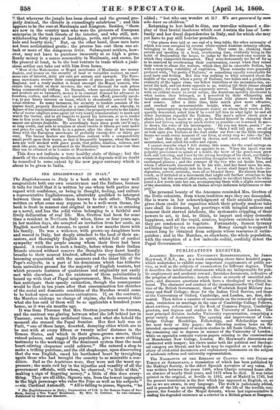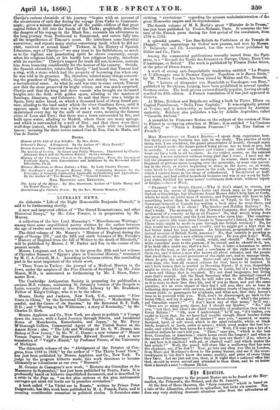PUBLICATIONS RECEIVED.
.A.CADEMIC REFORM AND UNIVERSITY REPRIBENTATION, by James Heywood, F.R.S., &c., is a book containing above three hundred pages, which undertakes to exhibit some important requirements of public ser- vice, as well as the subjects of examination for different degrees. Thus it describes the intellectual attainments which are indispensable for pub- lic employment and academic reward ; furnishes documents, indicative of the progress of amelioration ; inserts others as records of unsettled sub- jects; and discusses questions which have a theological or political in- terest. The character and conduct of the examinations for the Civil Ser- vice of the British Government, those of Woolwich Royal Military Aca- demy and Staff College ; those for the Indian Civil Service, and those of the Universities of Oxford, Cambridge, and London, are, first, deli- neated. Then follow a number of memorials on the removal of religious tests, restriction on marriage in the case of Cambridge College Fellows, short services, reformation of the Book of Common Prayer Cambridge proctors, and degrees and studies in the University of London. The next principal division includes University representation, comprising a great variety of documents. The opening and improvement of Cam- bridge College Headships, Fellowships, and Scholarships occupy the next forty or fifty pages ; the following section bears on the intended encouragement of modern studies in All Souls College, Oxford ; the remaining one to degrees in science of the University of London ; while an appendix contains various papers relating to the examinations of Manchester New College, London. Mr. Heywood's discussions are conducted with temper; his views under both the political and theologi- cal category are liberal, and his book may be regarded as a useful depo- sitory of evidential documents and explanatory statements on the subject of academic reform and university representation.
The NARRATIVE OF THE EMBASSY OF CLAVIJO TO THE COURT Or Timone er Sam.sucalin' a translation of which has been published by the Hakluyt Society, is the oldest Spanish narrative of any value. It was written between the years 1406, when Clavijo returned home after an absence of nearly three years, and 1412 when he died. It was twice printed in the original, at Seville in 1582, and at Madrid in 1782, but the present translation is the first which has appeared in English, or, so far as we are aware, in any language. The work is judiciously edited, and is preceded by an interesting sketch of the life of the terrible con- queror, the founder of the Mogul dynasty, whose last representative is ending his degraded existence as a convict in a British prison at Rangoon.
Clavijo's curious chronicle of his journey "begins with an account of the occurrences of each day during the voyage from Cadiz to Constanti- nople; a minute description of all the public edifices of that great capital before it fell into the hands of the Turks ; graphically describes the dangers of his voyage in the Black Sea ; recounts his adventures in the long journey from Trebizond to Samarcand, and enters fully into all the magnificence of Timour's court. He introduces some historiCal narratives ; and repeats many stories concerning lands which he did not visit, received at second hand." Ticknor, in his History of Spanish Literature, says of Clavijo—" we may trust to his faithfulness, as much as to the vigilant and penetrating spirit he shows constantly, except when his religious faith, or his hardly less religious loyalty, interferes with its exercise." Clavijo's respect for truth did not, however, restrain him from bouncing considerably for the honour of his country. Oviedo, the Spanish chronicler, relates that Clavijo " had heard that Timour had a ring, with a stone which had the property of becoming dim when any lie was told in its presence. He, therefore, related many things concern- ing the grandeur of Spain, which, though not strictly true, were so in a metaphorical sense. As what he said was true to some exient, Timour saw that the stone preserved its bright colour, and was much surprised. Clavijo said that the king had three vassals who brought six thousand knights into the field, with golden spurs, alluding to the masters of Santiago, Aloantara, and Calatrava : he said that there was a bridge in Spain, forty miles broad, on which a thousand head of sheep found pas- ture, alluding to the land under which the river Guadiana flows, until it appears again : that there was a lion and a bull in Spain, which were maintained every day by the milk of many cows, meaning the famous cities of Leon and Toro ; that there was a town surrounded by fire, and built upon water, alluding to Madrid, where there are many springs, and which is surrounded by a wall of flint : and that there were three wolf-dogs (canes), which fought in the field, each with two hundred lances ; meaning the three towns named Can de Rea, Can de Mune, and Can de Zurita."
BOOKS.
Memoir of the Life of Ary Scheyer. By Mrs. Grote.
Deborah's Diary. A Fragment. By the Author of " Mary Powell." Breton Legends. Translated from the French.
The Queens of Satiety. By Grace and Philip Wharton. Illustrated by Charles Altamont Doyle and the Brothers Dalziel. In two volumes.
History of the Christian Church to the Reformation. From the German of Professor Hurts, with Emendations and Additions by the Reverend Alfred Edersheim, Phi), Eleanor Morrison, or Home Duties ; a Tale. By Lady Charles Thynne. The Gardener's and Farmer's Beason Why. Containing Reasons for the Principles of Scientific Cultivation Applicable to Gardening and Agriculture. By the Author of " The Reason Why, " General Science," &c.
NEW EDITIONS AND REPRINTS.
The Lady of the Manor. By Mrs. Sherwood, Author of" Little Henry and his Bearer Boosy," Sec.
Revelations of a Catholic Priest. By the Rev. Morton Maurice, C.C.



























 Previous page
Previous page